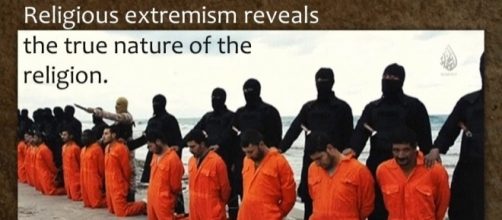Prior articles in this series mentioned Russia’s April 20 Supreme Court decision to ban the religious organization of Jehovah’s Witnesses and criminalize all religious activity by members. The Russian Federation confiscated the Administrative Center of Jehovah’s Witnesses, near Saint Petersburg, and its 395 national chapters, turning all property and holdings over to the government. Consequently, Forum 18 News Service’s Website reports more than 40 instances of vandalism and arson, assaults, threats of violence against Jehovah’s Witnesses—even intimidation of school-age children—just since April 20.
That’s more than one per day. Who are the assailants, or, put more plainly, who are the criminals committing these criminal acts against Jehovah’s Witnesses?
Russian Federation: Ban on Jehovah’s Witnesses is an assault on Freedom of Assembly and Conscience https://t.co/Xbq8G3K704
— Rights in Russia (@rightsinrussia) 11 May 2017
Acceptable crimes by Orthodox Catholics
Pew Research Center’s Polling and Analysis Webpage reports that 72% of Russia’s 145 million inhabitants identify as Orthodox Catholics (roughly 104 million). They outnumber Jehovah’s Witnesses by nearly 600 to one. So the 40-plus incidents of crimes reported by Forum 18 most likely were committed by Orthodox Catholics.
#Russian #Orthodox #Church supports ban on #Jehovah's Witnesses in Russia https://t.co/pfEiSJJPIN
— Hans-MartientenNapel (@hmtennapel) 3 May 2017
#Russian #Orthodox #Church supports ban on #Jehovah's Witnesses in Russia https://t.co/pfEiSJJPIN
— Hans-MartientenNapel (@hmtennapel) 3 May 2017
Follow the leader
Unless government policy requires hiring atheists, this would be true too of the police and special government agents—often masked and heavily armed with automatic weapons—who, as various YouTube videos attest, continue invading sacred spaces, interrupting peaceable assembly and religious services. Agents aggressively intimidate. Jehovah’s Witnesses respond peacefully, without resistance. Officials make dramatic grand entrances, climbing through windows into packed auditoriums instead of using entrance doors like everyone else. They jump fences, destroy gates and blowtorch entrance doors instead of merely knocking.
What is extremism anyway?
The trappings of Nazi extremism included concentration camps, forced hard labor, inhuman living conditions, torture and the extermination of six million victims. The phrase “Islamic extremism” has become associated with acts of tribal rape and forced concubinage, mass murders and way-too-many barbaric beheadings, usually for a YouTube audience. None of these unquestionably extremist acts has ever been imputed to Jehovah’s Witnesses, whether in Russia or anywhere else.
Why Jehovah’s Witnesses cannot be extremists
Nowhere do the actions or conduct of Jehovah’s Witnesses fit the definition of extremism—not even close—for at least four reasons:
British Government responds to Russia's ban on Jehovah's Witnesses https://t.co/A5Ni9ieugM
— Brian (@friesan872) 28 May 2017
- Russian officials countless times have raided and searched Witness homes and religious buildings without warrant. Such illegal invasions have never uncovered anything remotely associated with terrorists: weapons stockpiles, suicide-bomb plots, secret strategies to overthrow the Kremlin. Instead, officials only occasionally “find” supposedly “extremist” Bibles—whatever that means—and Bible publications, practically all of which the officials themselves illegally plant there, often right during their searches. To most reasonable people, it is such costly, useless, dogged pursuit of a totally peaceable group that seems “extreme,” though not “extremist.”
- Russian officials apply vague anti-extremism legislation to Jehovah’s Witnesses, despite criticism from Russia’s own legal experts who condemn this action. Since Russian law does not justify their mistreatment of Jehovah’s Witnesses, Russian authorities have invented the term “religious extremism.” None of Russia’s own religious scholars can define precisely what that is.
- International entities—including the Parliamentary Assembly of the Council of Europe and the United Nations Human Rights Committee—have repeatedly ‘called on Russian authorities to refrain from applying the law on extremist activity against all religious communities, especially Jehovah’s Witnesses.’
- Jehovah’s Witnesses never take up arms. As conscientious objectors, they refuse to murder anyone, anywhere, even if ordered to do so. Thousands have surrendered their freedom—even their lives—because their persecutors don’t (or won’t) recognize that their strict neutrality neither harms Russia nor helps any other nation. When incarcerated or subjected to cruel oppression, they do not harbor hatred for their tormentors.
Objective observers around the world clamor against the Russian government’s extreme measures in its illegal and outrageous treatment of Jehovah’s Witnesses.
Christians with un-Christian behavior
Russian law enforcement’s look-the-other-way policy echoes what their United States counterparts did in the 1930s and 1940s, when patriotic Americans falsely accused, attacked, tarred and feathered, and jailed Jehovah’s Witnesses—and committed even worse atrocities. Now Russia’s Orthodox Catholics commit such crimes with impunity. No one calls such radical Orthodox behavior “extreme,” much less “extremist.” Yet Jehovah’s Witnesses pray or speak to others about their faith, and that, according to ‘good’ Orthodox Catholics, is ‘extremist’ activity. Who, would you say, needs to do a bit more praying?
The arrest comes after Russia banned Jehovah's Witnesses. https://t.co/5Li8PRX5hN
— USA TODAY (@USATODAY) 27 May 2017


